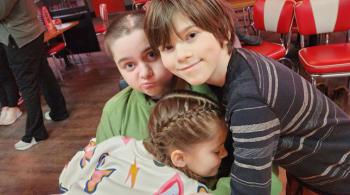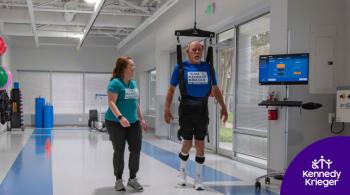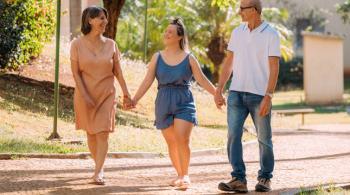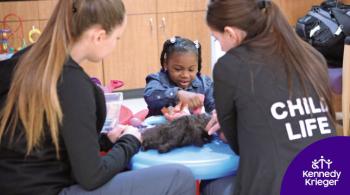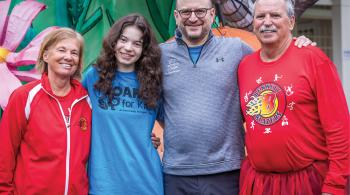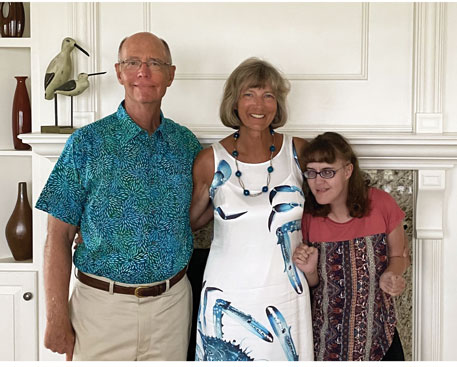
and their daughter, Nicole.
Neurological disorders such as autism spectrum disorder (ASD), anxiety disorder and attention-deficit/hyperactivity disorder are common. Yet people with these conditions often experience major difficulties when making their way in the world.
“Our daughter, Nicole, who is now a young adult, has special needs and multiple disabilities, including a significant anxiety disorder,” says Kennedy Krieger Institute donor Jeanne Roberts. “Because of her, we know first-hand how debilitating an anxiety disorder can be. We donate to research involving anxiety disorders in young children, hoping this research will lead to interventions that will make a dramatic difference to children and their families in the future.”
Jeanne and her husband, Ray Roberts, are two of the many donors who support research on common disorders at Kennedy Krieger. Because common disorders, by definition, affect so many people, donor support for research on common disorders has the potential to improve quality of life for millions of people around the world.
“As researchers, our goal is to make major breakthroughs in knowledge to improve healthcare, education and quality of life for people with neurological disorders,” says Dr. Rebecca Landa, founder and executive director of Kennedy Krieger’s Center for Autism and Related Disorders (CARD) and Research in Education for All Children (REACH) program. “Federal funding for research is extremely competitive, and to apply for it, you have to be able to show that your hypothesis is in the right ballpark. Donor dollars allow us to collect the preliminary data needed to do that.”
Early Screening and Intervention
In the three decades that Dr. Landa, who also serves as a vice president for the Institute, and her team have been studying ASD, they’ve uncovered a lot about it. They’ve learned that ASD, which can cause delays in social and communication development, can be inherited, and that on average, 20% of children with an older sibling with ASD also have the disorder.
The researchers at CARD are developing early screening tests—called “screeners”—for ASD and early interventions for young children with, or at an elevated likelihood of having, ASD or delayed communication. Eight years ago, Dr. Landa and her team developed an ASD screener for children 1 to 5 years old. Five years later, they split it into two screeners—one for kids 12 to 36 months old, and one for older preschoolers—to make screening as precise as possible.
The younger group’s screener, called the Social Communication Interaction and Play Screener (SCIPS), is particularly groundbreaking, as it can lead to more rapid early diagnosis and intervention. “It’s really important to identify children whose development isn’t on track when they’re really young, a very formative time in brain development, and early intervention can make a big difference,” Dr. Landa says.
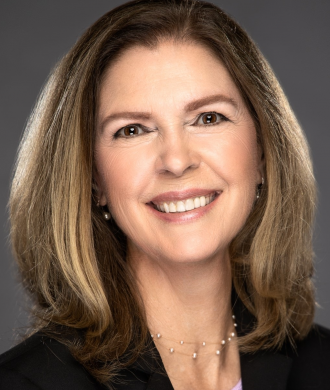
The screener uses short videos of children 1 to 2 years old, with and without ASD, for parents to watch before answering a set of questions about their child’s behavior, based on what they saw in the videos.
“This is very elucidating for families because they don’t always have access to that kind of information about development,” Dr. Landa says. The screener automatically converts each parent’s responses into a score that indicates their child’s likelihood of having ASD or a communication delay.
“So far, the data show that this tool is highly accurate,” Dr. Landa says. “Once the research is complete, we want to make this available to the community, with the hope that pediatricians will adopt it, so that it can do the good that we designed it to do.”
We know that donors can choose to give anywhere, and for them to choose us as a recipient is an enormous honor.” – Dr. Rebecca Landa
‘Immense Gratitude and Inspiration’
Well-funded research allows Kennedy Krieger’s faculty members to study multiple aspects of a disorder, to get as full a picture as possible of the condition. For example, Dr. Calliope Holingue, a psychiatric epidemiologist at CARD, is studying how gastrointestinal issues affect people with ASD, as part of her larger quest to improve the health of this and other neurodivergent populations.
“Autistic individuals are much more likely to experience gastrointestinal symptoms throughout their life” than are neurotypical individuals, she says, “although we still don’t know why. We need to figure out what contributes to poor gut health for this patient population, including diet, microbiome imbalance, anxiety or medication for co-occurring conditions.”
In a recently published study, Dr. Holingue and her team interviewed 12 families with autistic children about how the children’s gastrointestinal symptoms affected their quality of life.
“They reported that these symptoms affect their child’s ability to attend school and participate in work and social activities, and can cause pain and physical and mental distress,” she says. “These GI symptoms can really be disabling, which can reduce an individual’s ability to engage with community opportunities to the same degree that other people can. This creates inequity, as they cannot benefit from those same opportunities. By assessing and treating these symptoms, we can not only improve someone’s quality of life, but also help reduce those inequities.”
The study’s findings will allow Dr. Holingue and her colleagues to take their research to the next level, including studying a greater number of participants. “Donor funding can help us be more inclusive in recruiting participants, and can allow us to compensate them,” she says. “Not everyone is able to give up an hour or two of their time without getting paid. By offering incentives, we can reach a broader population.”
Funding also lets researchers focus on important work that they otherwise might not get to do. “I want to focus on research that is meaningful and important to the community,” Dr. Holingue says. “Knowing that a donor has made a donation because they feel the work is important really adds gravitas and motivation to my work and reinforces its importance.”
“The two biggest feelings I have for our donors are immense gratitude and inspiration,” Dr. Landa adds. “We know that donors can choose to give anywhere, and for them to choose us as a recipient is an enormous honor. It inspires me to know that, through the generosity of donors, we can take important next steps to hasten the discovery of new ways to help change kids’ lives.”









